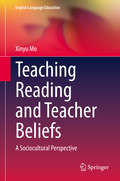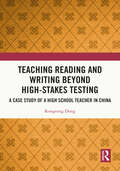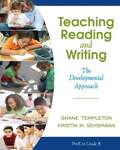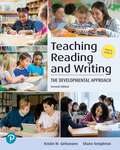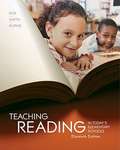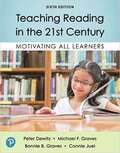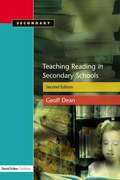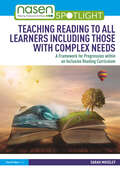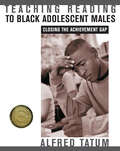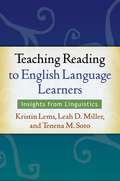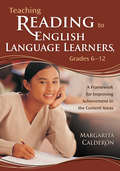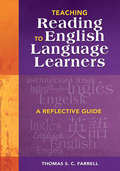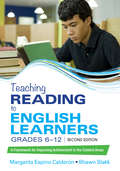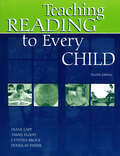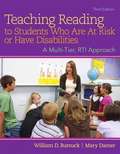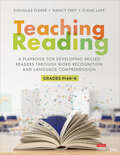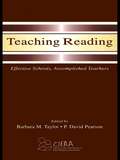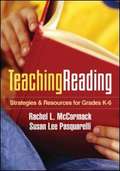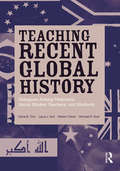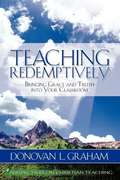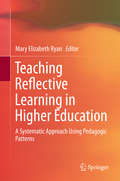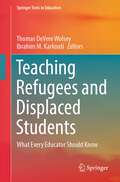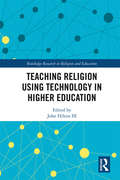- Table View
- List View
Teaching Reading and Teacher Beliefs: A Sociocultural Perspective (English Language Education #20)
by Xinyu MoThis book explores language teacher beliefs in English as a Foreign Language (EFL) reading instruction in the context of Chinese university English instructors. Since the 1990s, there has been a renewed interest on teacher beliefs in the domain of language teacher cognition. However, most studies in this area aim at investigating the relationship between particular aspects of teacher beliefs and classroom practices, largely ignoring the complexity of teacher beliefs. This study explores the issue from an alternative perspective by conceptualizing teacher beliefs as a complex, dynamic and multi-faceted system. By adopting five rounds of interview and four classroom observations, the year-long study reveals seven key features of the belief system shared among six participants. It calls for the holistic, complex and insider view to examine teacher beliefs in relation to the sociocultural and historical contexts where the teachers work and live.
Teaching Reading and Writing Beyond High-stakes Testing: A Case Study of a High School Teacher in China
by Rongrong DongThis book tells about an exemplary high school Chinese language arts teacher’s effort in nurturing life-long readers and writers under the test-driven culture in China’s society. It looks closely at his everyday literacy practices, focuses on his ways of creating authentic reading and writing spaces for students beyond test preparation. With the lens of social constructivism, the case study reveals his efforts of creating safe learning environment, modeling his literate life, connecting real life with literacy learning and building a school-wide literate life for students. Furthermore, he also collaborates with other Chinese language arts faculty, reaches out to school administrators and educators to gain any potential teaching resource for students. The findings indicate exemplary teachers are not only equipped with professional knowledge but also inter/intrapersonal knowledge and practical knowledge in their teaching career, which might be enlightening in today’s high-stakes testing culture. The book will appeal to scholars of literacy education and teacher education, as well as pre-service & in-service teachers.
Teaching Reading and Writing: The Developmental Approach
by Shane Templeton Kristin GehsmannTeaching Reading and Writing: The Developmental Approach is a comprehensive yet accessible guide to the tools and knowledge pre-service and experienced teachers need to teach literacy in a developmentally-responsive and integrated way―while meeting the diverse needs of students in today’s classrooms. Using a conversational tone to present a wealth of critical content, the book helps readers connect theory to practice through vignettes and sample lessons from real classrooms; authentic student work samples; ideas for using and integrating print-based and digital texts across the curriculum; and tools for organizing and managing a comprehensive, developmentally-responsive literacy program.
Teaching Reading and Writing: The Developmental Approach
by Shane Templeton Kristin GehsmannTeaching Reading and Writing: The Developmental Approach is a comprehensive guide to creating developmentally and culturally responsive literacy instruction that meets the diverse needs of students in PreK-8 classrooms. The text reflects an integrated model of literacy instruction based on the understanding that reading and writing are developmental processes.
Teaching Reading in Today's Elementary Schools Eleventh Edition
by Betty D. Roe Sandy H. SmithThis market-leading text sets the standard for reading instruction to ensure that aspiring teachers are able to help students learn not only how to recognize words, but also how to comprehend what they read--and enjoy the process. The book balances new approaches to reading, such as language arts integration and emergent literacy/literacy as a continuum, with more traditional foundations of strong skills and phonics instruction. Updates to the Eleventh Edition include discussion of the latest technology for literacy learning, how writing instruction impacts literacy learning, and recent movements in literacy assessment.
Teaching Reading in the 21st Century: Motivating All Learners
by Connie Juel Michael Graves Peter Dewitz Bonnie GravesA student-centered focus on reading instruction that fosters students’ motivation and passion for reading. <p><p> Teaching Reading in the 21st Century: Motivating All Learners takes a student-centered approach to teaching reading, emphasizing motivation over efficiency in order to develop students who want to read, and therefore can read. Based on the most current research, this text covers the five major components of reading while constantly reinforcing the idea that motivation leads to students who read widely and deeply, allowing the students’ fluency, vocabulary, and comprehension to grow. <p><p> The 6th Edition has been extensively revised, with a new chapter (6) on selecting texts, significant updates to the topic of assessment, and an increased emphasis on digital texts and other online resources.
Teaching Reading in the Secondary Schools
by Geoff DeanThis book outlines several approaches to reading which challenge former classroom practices. It is through these approaches that all students - from reluctant boys to the most able of either gender - can continue to grow as readers and develop their readiness to seek meaning in texts.
Teaching Reading to All Learners Including Those with Complex Needs: A Framework for Progression within an Inclusive Reading Curriculum (nasen spotlight)
by Sarah MoseleyLearning to read and having access to a rich reading curriculum has a huge impact upon us both emotionally and academically. so how can we ensure that it is seen as an entitlement of all learners, including those defined as having profound and multiple learning difficulties (PMLD) and the most complex needs? This accessible book provides professionals with the knowledge and confidence to develop reading for all learners. It integrates the latest ideas and research into a practical framework to create an inclusive reading curriculum and support learners across the whole education spectrum, including those with the most complex needs. Each chapter includes a mixture of research, strategies, and case study examples, demonstrating how reading supports both wellbeing and access to learning and - with stories - provides a versatile vehicle to build on vocabulary and expand our ability to think and learn about our place in the world. Teaching Reading to All Learners Including Those with Complex Needs is essential reading for both new and experienced teachers and special educational needs and disabilities coordinators (SENDCo)s looking to develop an inclusive reading curriculum and culture which will positively impact on the outcomes of all young people.
Teaching Reading to Black Adolescent Males: Closing the Achievement Gap
by Alfred W. TatumThe racial achievement gap in literacy is one of the most difficult issues in education today, and nowhere does it manifest itself more perniciously than in the case of black adolescent males. Approaching the problem from the inside, author Alfred Tatum brings together his various experiences as a black male student, middle school teacher working with struggling black male readers, reading specialist in an urban elementary school, and staff developer in classrooms across the nation. His book, Teaching Reading to Black Adolescent Males: Closing the Achievement Gap' addresses the adolescent shift black males face and the societal experiences unique to them that can hinder academic progress. With an authentic and honest voice, Tatum bridges the connections among theory, instruction, and professional development to create a roadmap for better literacy achievement. He presents practical suggestions for providing reading strategy instruction and assessment that is explicit, meaningful, and culturally responsive, as well as guidelines for selecting and discussing nonfiction and fiction texts with black males. The author' s first-hand insights provide middle school and high school teachers, reading specialists, and administrators with new perspectives to help schools move collectively toward the essential goal of literacy achievement for all.
Teaching Reading to English Language Learners
by Leah Miller Kristin LemsWritten specifically for K 12 educators, this accessible book explains the processes involved in second-language acquisition and provides a wealth of practical strategies for helping English language learners (ELLs) succeed at reading. The authors integrate knowledge from two fields that often remain disconnected linguistics and literacy with a focus on what works in the classroom. Teachers learn effective practices for supporting students as they build core competencies not just for reading in English, but also for listening, speaking, and writing. Engaging vignettes and examples illustrate ways to promote ELLs' communicative skills across the content areas and in formal and informal settings.
Teaching Reading to English Language Learners, Grades 6-12: A Framework for Improving Achievement in the Content Areas
by Margarita Espino CalderonA powerful array of field-tested literacy tools for closing the achievement gap! This book provides a comprehensive and systematic framework for developing literacy skills and improving reading in all content areas. With funding from the Carnegie Corporation and the U.S. Department of Education, author Margarita Calderón has developed a research-based approach to expediting reading comprehension that results in higher test scores not just for ELLs, but for all students. Educators can easily complement their instruction with ready-to-use tools, including: Lesson templates Rubrics Sample lesson plans Strategies for teaching reading and vocabulary in content areas Descriptions of successful programs Professional development designs
Teaching Reading to English Language Learners: A Reflective Guide
by Thomas S. FarrellThis resource offers practical methods for helping ELLs succeed in reading, with strategies to increase fluency and comprehension, teach vocabulary and text structure, and more.
Teaching Reading to English Learners, Grades 6 - 12: A Framework for Improving Achievement in the Content Areas
by Margarita Espino Calderon Shawn M. Sinclair-SlakkRetool your whole school for EL achievement For any student, middle and high school can be challenging. But for an English learner or striving reader—and the myriad words, phrases, syntax, texts, and concepts they must negotiate on a daily basis—the stakes seem a whole lot higher. Fortunately for content-area teachers, Margarita Calderón and Shawn Slakk make available in a single resource all the best instructional and professional development combinations for expediting comprehension across the secondary grades. Really a tool to assist all learners across all language needs, the second edition of Teaching Reading to English Learners, Grades 6-12, provides evidence-based strategies for helping content-area teachers and schools at large: Teach academic language in all subject areas Embed discourse practice through interaction strategies Integrate basic and close reading comprehension skills into lessons Teach drafting, revising, and editing for content-specific writing Use cooperative learning to develop social emotional skills and enhance academic achievement Calderón and Slakk know firsthand that if we’re to counter the commonly held narrative of predictable failure among our ELs, it takes a whole school, and they have the evidence to prove it. Read Teaching Reading to English Learners, Grades 6-12, implement its strategies across all classrooms, and soon enough you, too, will maximize the comprehensions skills so critical to our ELs’ long-term success.
Teaching Reading to English Learners, Grades 6 - 12: A Framework for Improving Achievement in the Content Areas
by Margarita Espino Calderon Shawn M. Sinclair-SlakkRetool your whole school for EL achievement For any student, middle and high school can be challenging. But for an English learner or striving reader—and the myriad words, phrases, syntax, texts, and concepts they must negotiate on a daily basis—the stakes seem a whole lot higher. Fortunately for content-area teachers, Margarita Calderón and Shawn Slakk make available in a single resource all the best instructional and professional development combinations for expediting comprehension across the secondary grades. Really a tool to assist all learners across all language needs, the second edition of Teaching Reading to English Learners, Grades 6-12, provides evidence-based strategies for helping content-area teachers and schools at large: Teach academic language in all subject areas Embed discourse practice through interaction strategies Integrate basic and close reading comprehension skills into lessons Teach drafting, revising, and editing for content-specific writing Use cooperative learning to develop social emotional skills and enhance academic achievement Calderón and Slakk know firsthand that if we’re to counter the commonly held narrative of predictable failure among our ELs, it takes a whole school, and they have the evidence to prove it. Read Teaching Reading to English Learners, Grades 6-12, implement its strategies across all classrooms, and soon enough you, too, will maximize the comprehensions skills so critical to our ELs’ long-term success.
Teaching Reading to Every Child
by Douglas Fisher James Flood Diane Lapp Cynthia H. BrockThis popular text, now in its Fourth Edition, introduces pre-service and in-service teachers to the most current theories and methods for teaching literacy to children in elementary schools. The methods presented are based on scientific findings that have been tested in many classrooms. A wealth of examples, hands-on activities, and classroom vignettes--including lesson plans, assessments, lists of children's literature books to fiction and nonfiction texts, and more--illustrate the methods and bring them to life.The text highlights the importance of teaching EVERY child to become competent in all of the nuances and complexities of reading, writing, and speaking.The value of reflection and peer discussion in learning to expand their students' literacies is emphasized. Readers are encouraged to reflect on their own experiences with reading and teaching throughout their lifetimes--experiences that will serve well in learning to teach reading. "Your Turn" boxes invite readers to think about their views of the material presented, and to talk with colleagues and teachers about their "best ways" of learning this new information. "Did You Notice?" boxes engage readers in observation and analysis of methods and classroom situations discussed in the text. Teachers' stories serve as models of successful teaching and to draw readers into professional dialogue about the ideas and questions raised. End-of-chapter questions and activities provide additional opportunities for reflection and discussion. All of these pedagogical features help readers expand and refine their knowledge in the most positive ways.Topics covered in Teaching Reading to Every Child, Fourth Edition:*Getting to Know Your Students as Literacy Learners;*Looking Inside Classrooms: Organizing Instruction;*Assessing Reading Achievement;*The Importance of Oral Language in Developing Literacy;*Word Identification Strategies: Pathways to Comprehension;*Vocabulary Development;*Comprehension Instruction: Strategies At Work;*Content Area Learning;*What the Teacher Needs to Know to Enable Students' Text Comprehension;*Writing: Teaching Students to Encode and Compose;*Discovering the World Through Literature;*Technology and Media in Reading;*Teaching Reading to Students Who Are Learning English;*All Students are Special: Some Need Supplemental Supports and Services to Be Successful; and*Historical Perspectives on Reading and Reading Instruction.New in the Fourth Edition:*A new chapter on technology with state-of-the-art applications;*A new chapter with the most up-to-date information on how vocabulary is learned and on how it is best taught, responding to the national renewed interest in vocabulary instruction;*A new section on Readers/Writer's workshop with a focus on supporting student inquiry and exploration of multiple genres;*A more comprehensive chapter on literature instruction and the role of literature in the reading program with examples that support students' multigenre responses;*A discussion of literary theories with examples for classroom implementation;*Broader coverage of the phases of reading development from the pre-alphabetic stage to the full alphabetic stage;*A more inclusive chapter on writing instruction; and*A thoroughly revised chapter on teaching reading to students who are learning English, including extensive information on assessment and evaluation.
Teaching Reading to Students Who Are At Risk or Have Disabilities: A Multi-Tier, RTI Approach
by William D. Bursuck Mary DarnerAt a time when public focus on children who struggle with learning to read has never been greater, Bursuck and Damer''s Teaching Reading to Students Who Are at Risk or Have Disabilities, 3/e does an extraordinary job of answering the charge to help all students succeed at reading. Now in a newly updated Third Edition, this text describes, in a clear, step-by-step fashion, how to implement a systematic, explicit, success-oriented approach for teaching struggling readers in today''s accountability-driven schools. When recently evaluated in terms of relating to the Common Core Standards in Early Reading, this book was described as one of the few textbooks "comprehensively and rigorously covering the scientific basis and instructional elements of the five essential components of effective reading instruction. Integrated throughout are authentic, research-validated, reality-based strategies, accessible language and video demonstrations, and checks for student understanding.
Teaching Reading: A Playbook for Developing Skilled Readers Through Word Recognition and Language Comprehension (Corwin Literacy)
by Douglas Fisher Nancy Frey Diane K. LappThe comprehensive guide you can trust for evidence-based reading practices It′s settled science: developing skilled readers can enhance students’ lives. That’s why renowned educators Douglas Fisher, Nancy Frey, and Diane Lapp wrote this resource with the urgency of a code blue in an ER—because too many children, for many reasons, struggle with learning to become strong readers. Designed to be a one-stop shop for best practices, Teaching Reading is concise, encyclopedic, and essential. Thirteen interactive modules provide easy to read ideas to support you teaching every child to read very well. You will learn how to: Focus on two critical aspects of reading—word recognition and language comprehension. Select the best activities to support students in grades K-6 to learn letters and sound relationships. Provide developing readers with the most effective oral, written, and reading experiences. Recharge your confidence and craft with uplifting new research findings from neuroscience, cognitive science, and child development. Clear up confusions about phonics progressions, reading fluency, morphology, text selection, grammar, and more. Develop background knowledge, vocabulary, and comprehension instruction. Be up to date on how to help students attain deeper levels of comprehension by applying Theory of Mind and other cutting-edge ideas. Reading is a thrilling but complex process. It involves a heady mix of skills, schema, self-concept, and social dimensions. To give all students the chance to reap its rewards, we need a go-big kind of resource. This is it.
Teaching Reading: A Playbook for Developing Skilled Readers Through Word Recognition and Language Comprehension (Corwin Literacy)
by Douglas Fisher Nancy Frey Diane K. LappThe comprehensive guide you can trust for evidence-based reading practices It′s settled science: developing skilled readers can enhance students’ lives. That’s why renowned educators Douglas Fisher, Nancy Frey, and Diane Lapp wrote this resource with the urgency of a code blue in an ER—because too many children, for many reasons, struggle with learning to become strong readers. Designed to be a one-stop shop for best practices, Teaching Reading is concise, encyclopedic, and essential. Thirteen interactive modules provide easy to read ideas to support you teaching every child to read very well. You will learn how to: Focus on two critical aspects of reading—word recognition and language comprehension. Select the best activities to support students in grades K-6 to learn letters and sound relationships. Provide developing readers with the most effective oral, written, and reading experiences. Recharge your confidence and craft with uplifting new research findings from neuroscience, cognitive science, and child development. Clear up confusions about phonics progressions, reading fluency, morphology, text selection, grammar, and more. Develop background knowledge, vocabulary, and comprehension instruction. Be up to date on how to help students attain deeper levels of comprehension by applying Theory of Mind and other cutting-edge ideas. Reading is a thrilling but complex process. It involves a heady mix of skills, schema, self-concept, and social dimensions. To give all students the chance to reap its rewards, we need a go-big kind of resource. This is it.
Teaching Reading: Effective Schools, Accomplished Teachers
by P. David Pearson Barbara M. TaylorThis unique book tells the story of a select group of schools and teachers who have managed to beat the odds in terms of improving elementary students reading achievement. Originating with the CIERA School Change Project directed by Barbara Taylor and David Pearson, it was subsequently expanded to include the work of other research teams doing similar work. It combines large scale studies of effective schools and teachers (Part I) with case studies of individual schools and teachers who have successfully transformed research findings into situation-specific strategies appropriate to their schools and classrooms (Parts II and III). The book's distinct contribution is showing that no matter how consistent the research findings on effective school and classroom practice, groups of teachers must improvise their own situation-specific programs and practices. In short, they must be able to create variations on a common theme. Key features of this outstanding new volume include: *Integration of research and cases--One cannot fully understand research-based general principles without knowing how they play themselves out in specific settings. Similarly, one cannot fully understand cases without seeing the commonalities across different schools and classrooms sharing similar goals. This book provides both perspectives. *Diverse cases--The schools and classrooms depicted in this book are urban, rural, and suburban; poor and middle class; and English-only and bilingual. Rather than telling readers how to beat the odds, it provides them with a wide variety of cases from which they can extrapolate to build their own customized teaching programs and practices. *Summarizing section--The final section contains a summary of research on effective schools and teachers and a concluding chapter by Gerry Duffy and Jim Hoffman in which they reflect on the book's content and possible directions for future research. The book is targeted to both in-service elementary teachers and literacy students in advanced college courses.
Teaching Reading: Strategies and Resources for Grades K-6
by Rachel L Mccormack Susan Lee PasquarelliElementary teachers of reading have one essential goal—to prepare diverse children to be independent, strategic readers in real life. This innovative text helps preservice and inservice teachers achieve this goal by providing knowledge and research-based strategies for teaching phonemic awareness, phonics, fluency, vocabulary, all aspects of comprehension, and writing in response to literature. Special features include sample lessons and photographs of literacy-rich classrooms. Uniquely interactive, the text is complete with pencil-and-paper exercises and reproducibles that facilitate learning, making it ideal for course use. Readers are invited to respond to reflection questions, design lessons, and start constructing a professional teaching portfolio.
Teaching Recent Global History: Dialogues Among Historians, Social Studies Teachers and Students
by Robert Cohen Diana B. Turk Laura J. Dull Michael R. StollTeaching Recent Global History explores innovative ways to teach world history, beginning with the early 20th century. The authors’ unique approach unites historians, social studies teachers, and educational curriculum specialists to offer historically rich, pedagogically innovative, and academically rigorous lessons that help students connect with and deeply understand key events and trends in recent global history. Highlighting the best scholarship for each major continent, the text explores the ways that this scholarship can be adapted by teachers in the classroom in order to engage and inspire students. Each of the eight main chapters highlights a particularly important event or theme, which is then complemented by a detailed discussion of a particular methodological approach. Key features include: • An overarching narrative that helps readers address historical arguments;• Relevant primary documents or artifacts, plus a discussion of a particular historical method well-suited to teaching about them;• Lesson plans suitable for both middle and secondary level classrooms; • Document-based questions and short bibliographies for further research on the topic. This invaluable book is ideal for any aspiring or current teacher who wants to think critically about how to teach world history and make historical discussions come alive for students.
Teaching Redemptively: Bringing Grace And Truth Into Your Classroom
by Donovan GrahamPublisher's description. As God's image bearers, Christian teachers are called to reflect the character of our creative, redemptive God and to live according to His truth. This book encourages and challenges Christian teachers in any setting, public or private, secular or Christian, to teach redemptively--to employ biblical principles in all aspects of the educational process.
Teaching Reflective Learning in Higher Education
by Mary Elizabeth RyanThis book is about understanding the nature and application of reflection in higher education. It provides a theoretical model to guide the implementation of reflective learning and reflective practice across multiple disciplines and international contexts in higher education. The book presents research into the ways in which reflection is both considered and implemented in different ways across different professional disciplines, while maintaining a common purpose to transform and improve learning and/or practice. The Readers will find this book is innovative and new in three key ways. Firstly, in its holistic theorisation of reflection within the pedagogic field of higher education; Secondly, in conceptualising reflection in different modes to achieve specific purposes in different disciplines; and finally, in providing conceptual guidance for embedding reflective learning and reflective practice in a systematic way across whole programmes, faculties or institutions in higher education. The book considers important contextual factors that influence the teaching of forms and methods of reflection. It provides a functional analysis of multiple modes of reflection, including written, oral, visual, auditory, and embodied forms. Empirical chapters analyse the application of these modes across disciplines and at different stages of a programme. The theoretical model accounts for students' stage of development in the disciplinary field, along with progressive and cyclical levels of higher order thinking, and learning and professional practice that are expected within different disciplines and professional fields. Secondly, in conceptualising reflection in different modes to achieve specific purposes in different disciplines. It provides a functional analysis of multiple modes of reflection, including written, oral, visual, auditory, and embodied forms. Empirical chapters analyse the application of these modes across disciplines and at different stages of a programme in terms of demonstrating levels of reflection. The book includes images, diagrams and different text forms to support the creative applications of reflection. And thirdly, the book is innovative in providing conceptual guidance for embedding reflective learning and reflective practice systematically across whole programmes, faculties or institutions in higher education contexts across the world.
Teaching Refugees and Displaced Students: What Every Educator Should Know (Springer Texts in Education)
by Thomas DeVere Wolsey Ibrahim M. KarkoutiThis textbook serves as a guide for practitioners whose goal is to enhance refugee students’ learning experiences. With millions of children globally in refugee or seeking asylum status, this volume is a must-read for every 21st century educator. Often, refugee students have missed a substantial amount of schooling as a result of the disruptions in their home countries and transit through refugee camps. Others have never been to school at any time. Refugees enter school with the same hopes and aspirations as other students, but they also confront serious challenges.This textbook helps educators to restore hope through the following topics: empowering refugees in school liberating structures in resettlement camps increasing opportunity at university designing compassionate pedagogies leveraging technology connecting the community Each chapter includes points to ponder as educators work to apply the principles of restoring hope for refugee students and their families. This textbook also provides practical suggestions and case studies that will help educators to put theory into practice. Teachers and professors who are passionate about honing their skills will find this book a comprehensive resource when displaced students enter their classrooms. This volume will also be of great interest to teacher-educators, pre-service teachers, educators serving in refugee camps and school administrators.
Teaching Religion Using Technology in Higher Education (Routledge Research in Religion and Education)
by John Hilton IIIThis edited collection helps those teaching religion in higher education utilize technology to increase student learning both inside and outside of the classroom. Recent times have seen major technological shifts that have important implications for how religion is taught at a post-secondary level. Providing multiple perspectives on a range of topics—including social media use and interactive classroom learning —this book presents a series of original case studies and insights on how technology can be used in religion classes in higher education to improve student learning.
